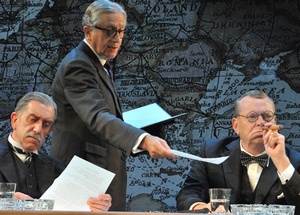SITE GUIDE
SEARCH
REVIEWS
REVIEW ARCHIVES
ADVERTISING AT CURTAINUP
FEATURES
NEWS
Etcetera and
Short Term Listings
LISTINGS
Broadway
Off-Broadway
NYC Restaurants
BOOKS and CDs
OTHER PLACES
Berkshires
London
California
New Jersey
DC
Connecticut
Philadelphia
Elsewhere
QUOTES
TKTS
PLAYWRIGHTS' ALBUMS
LETTERS TO EDITOR
FILM
LINKS
MISCELLANEOUS
Free Updates
Masthead
Writing for Us
A CurtainUp  London Review
London Review
 London Review
London ReviewThree Days in May
|
History will be kind to me because I shall write it. — Winston Churchill
|

Robert Demeger as Neville Chamberlain, Jeremy Clyde as Lord Halifax and Warren Clarke as Winston Churchill (Photo: Keith Pattison) |
Winston Churchill became Prime Minister on 10th May 1940, just sixteen days before the start of this play. Neville Chamberlain had to resign as Prime Minister because the Labour Group wouldnít work with him after the humiliation of Munich. The preferred choice as Prime Minister was the aristocrat Lord Halifax (Jeremy Clyde) rather than the idiosyncratic Churchill whose mother was American and who was seen as "a rogue elephant". Much of Three Days in May centres on the debate between Halifax and Churchill about how to proceed.
Warren Clarke reprises his role as Churchill. He has played him so often that he has perfected the Churchillian voice and mannerisms and looks enough like him for the suspension of disbelief. Also at the service at Westminster Abbey, with which the play opens, are Churchillís fellow Conservatives: Neville Chamberlain (Robert Demeger) and Lord Halifax (Jeremy Clyde), the appeasers of Hitler at Munich in 1938. Clement Atlee (Michael Sheldon) and Arthur Greenwood (Dicken Ashworth) represent the Labour Party in this wartime coalition war cabinet. Chamberlain was described as a man broken by the failure of the Munich agreement and here Robert Demeger has the air of depression that came from what he describes as "Hitler making a fool of him." Three Days in May is a heavily wordy play rather than a dramatised one but there are plenty of good visuals from the map on the walls and floor of the cabinet room, to the shadows of the leaves of the trees in the Downing Street garden. Interestingly, it isnít Chamberlain but Lord Halifax who presents the most resistance to Churchillís willingness to go to war rather than settling for Mussoliniís terms for peace, the proposed loss of both Gibraltar and the Suez Canal at either end of the Mediterranean and the surrender of some colonies in Africa. In the play, we see a meeting between Churchill and the French Prime Minister Paul Reynaud (Timothy Kightley) where the Frenchman wants England to agree to the Italian plans.
The play is framed by an introduction and conclusion from the Prime Ministerís Private Secretary Jock Colville (James Alper) whose autobiography has proved a valuable source for Ben Brown. I liked the personal aspect of the play. We are used to seeing archive footage of Churchill making those famously inspiring speeches but here we also see Churchill, the man, making this momentous and world changing personal decision. This is a perfect political play for those interested in history and the twentieth century. Iíll close on a Churchill quote from his account in his book, The Gathering Storm. ". It is where the balance quivers and the proportions are veiled in mist, that the opportunity for world-saving decisions presents itself. ". The stuff of great drama!
|
Subscribe to our FREE email updates with a note from editor Elyse Sommer about additions to the website -- with main page hot links to the latest features posted at our numerous locations. To subscribe,
E-mail: esommer@curtainup.comesommer@curtainup.com
put SUBSCRIBE CURTAINUP EMAIL UPDATE in the subject line and your full name and email address in the body of the message -- if you can spare a minute, tell us how you came to CurtainUp and from what part of the country. |
| Three Days in May
Written by Ben Brown Directed by Alan Strachan Starring: Warren Clarke, Jeremy Clyde, Robert Demeger With: James Alper, Michael Sheldon, Dicken Ashworth, Timothy Kightley, Paul Ridley Designed by Gary McCann Lighting/Video Design: Mark Howett Sound: Martin Hodgson Running time: Two hours with an interval Box Office: 0844 871 7627 Booking to 3rd March 2012 Reviewed by Lizzie Loveridge based on 10th November 2011 performance at Trafalgar Studios One, Whitehall, London SW1A 2D (Tube: Charing Cross) |
|
REVIEW FEEDBACK Highlight one of the responses below and click "copy" or"CTRL+C"
Paste the highlighted text into the subject line (CTRL+ V): Feel free to add detailed comments in the body of the email . . . also the names and emails of any friends to whom you'd like us to forward a copy of this review. |




